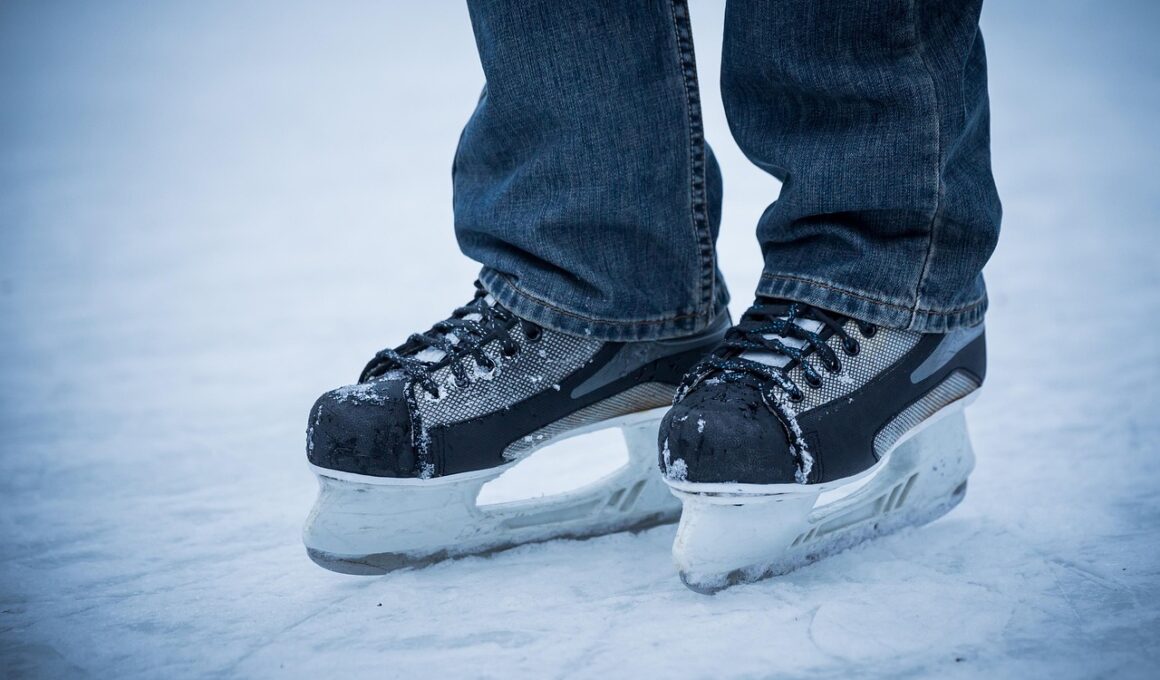Using Video Analysis to Improve Skating Skills
Video analysis has become a vital tool in modern sports coaching, particularly in skating. The ability to capture movements in real-time provides athletes an opportunity to review their performance and techniques critically. It allows coaches to show skaters precisely what aspects need improvement. By utilizing video analysis, skaters can observe their form, speed, and alignment on the ice or surface. This method creates a clearer understanding of their skating abilities compared to relying solely on verbal feedback. Furthermore, it caters to various learning styles, enhancing comprehension through visual aids. A skater can watch their runs several times, noticing details they may have missed during practice. With consistent feedback, it’s easier for them to adjust their techniques. Additionally, video analysis enables the comparison of performance over time, demonstrating progression or highlighting persistent issues. This evidence-based approach fosters a more structured training plan, motivating skaters to achieve their goals. Coaches can also utilize these videos to tailor training sessions specifically to the skaters’ needs, ensuring effective skill development. Thus, incorporating video analysis into skating coaching enhances performance and builds athlete confidence.
This method fosters a deeper understanding of technique nuances. Coaches can utilize this technology to break down intricate movements into segments, allowing athletes to learn each section effectively. Each movement can be scrutinized, pinpointing areas requiring focus. A skater might believe they are executing a technique correctly; however, video analysis may reveal inconsistencies not perceived in real-time. For instance, checking body positioning during jumps, landing techniques, and strides can provide notable insights. The ability to slow down frames or view from differing angles presents a comprehensive analysis, which is invaluable in improving skating skills. Moreover, employing tools such as performance software can quantify metrics like speed and angle, allowing for data-driven enhancements. Coaches can track statistics that show performance trends over time, contributing to more informed coaching strategies. As skaters identify specific areas needing attention, they can set measurable goals while tracking their progress visually. Furthermore, this continuous feedback loop enables skaters to stay engaged and motivated in their training. By visually witnessing improvements, skaters gain confidence, leading to better performance during competitions.
Enhancing Performance Through Feedback
Feedback is fundamental in sports coaching, and video analysis enriches this process immeasurably. Athletes often require immediate, constructive criticism to make adjustments effectively. Through video, coaches can deliver instant feedback, clarifying the areas needing modification. This immediacy makes video analysis an extraordinary tool for improving skating skills, as it allows skaters to adjust their techniques on the spot based on visual representations. For example, when a skater performs a series of jumps, reviewing the recorded footage immediately after offers insights into their take-off, formation, and landing. Coaches can provide real-time input while the skater reflects on their performance, making it easier to grasp essential corrections. Furthermore, regular analysis cultivates a growth mindset among athletes, encouraging them to seek continual improvement rather than perfection. It nurtures a culture where skaters actively seek feedback, fostering a collaborative environment between coach and athlete. As skaters become more receptive to guidance, they develop resilience and the ability to adapt to different scenarios, thereby enriching their overall performance. This continual learning process is vital for long-term success in competitive skating.
While traditional coaching methods rely heavily on verbal cues, video analysis provides a more concrete means of instruction. It can bridge the gap between coach and athlete comprehension. For skaters, watching their own performances reveals truths that verbal explanations often miss, translating coaching advice into actionable knowledge. The imaginative realm of possibilities unfolds as they analyze their skating style. It promotes self-awareness that takes time to develop. Improved self-regulation comes from seeing mistakes and successes on screen. Furthermore, skaters can share their videos with coaches for remote critique, making it easier to receive input during off-road practice times. This flexibility allows skaters to continue their growth even outside regular training sessions. By allowing athletes to take ownership of their improvement, skaters often feel proud of their progress. Coaches can lead discussions based on video reviews, fostering a more collaborative relationship. Placing the power in skaters’ hands while guiding them toward their goals leads to impressive results in performance. In essence, video analysis transforms the coaching landscape by providing a vital, visual component that inspires athletic development.
Integrating Technology into Training
As technology advances, integrating video analysis software into skating coaching becomes increasingly accessible. Various applications offer intuitive interfaces, making them user-friendly for both athletes and coaches. These tools allow for easy edits, annotations, and frame-by-frame breakdowns, enhancing the effectiveness of the analysis. Coaches can compile training videos showcasing various skills, presenting best practices for skaters to observe. Moreover, the capability of sharing these videos enhances collaborative learning among skaters. Teams can create a library of videos demonstrating both exemplary techniques and areas needing improvement. Access to high-quality video analysis can be transformative, especially with dedicated platforms designed for athlete development. Social media platforms also provide an avenue for sharing performances and seeking peer feedback. Engaging with a broader skating community can inspire athletes and encourage knowledge sharing. The combined power of these technological advancements boosts both individual and team performance, leading to greater skill acquisition and overall success. Coaches should prioritize proper training on video tools for maximum efficiency and usage. Thus, integrating technology becomes essential in nurturing the next generation of skaters.
Another worthwhile aspect of employing video analysis is developing a consistent training regimen. Athletes can watch their footage to review their evolution regularly, promoting accountability in the training process. Regular video reviews can create a schedule that allows structured sessions, ensuring athletes focus on various aspects systematically. Knowing what to work on and acknowledging achievements reinforces motivation. To do this, coaches must establish clear goals rooted in evidence-based practice, using the detailed insights gained from video analysis. They should collaboratively set objectives with skaters, emphasizing skills they need to develop and improve. Progress can be visually tracked using video analysis, leading to celebration moments when milestones are achieved. With each layer of success, skaters enhance their technique and enjoyment of the sport. Creating visual ‘before and after’ analyses serves as additional motivation, showcasing hard work leading to visible improvement. Skaters can look back on their progress over time, further solidifying the benefits of incorporating video analysis into their training. Thus, structured training combined with video insights enhances consistency and fosters lifelong skills.
Setting Goals and Tracking Progress
Effective goal-setting allows athletes to focus on their development, ensuring a clear pathway forward. Utilizing video analysis aids in establishing specific, measurable targets. Athletes can assess their skating through recorded footage, aligning their aspirations with visible performance metrics. This alignment between goals and video insights ensures skaters have a tangible reference point for their progress. Coaches should work with athletes to identify areas where improvement can occur, creating objectives that can be monitored over time. Regularly reviewing video captures for specific skills enables skaters to adapt training sessions based on their evolving needs. Furthermore, tracking these progressions, like successful jumps or smoother glides, aids in motivation. For instance, a skater can note improved speed or more consistent technique by comparing videos over weeks or months. With clear targets derived from video analysis, skaters are more likely to stay committed to their practice. This clarity fosters a positive feedback loop, encouraging skaters to maintain a proactive stance toward their improvement journey. Therefore, the integration of goal-setting and video analysis is a powerful combination for enhancing skating skills.
In conclusion, video analysis has revolutionized skating coaching, providing unprecedented opportunities for skill enhancement. The ability to visually analyze performances encourages skaters to take ownership of their development, build confidence, and foster continuous improvement. By leveraging video analysis, coaches can offer specific feedback in real-time, nurturing an environment of collaboration and growth. This structured approach to training promotes accountability among athletes while allowing for personalized coaching strategies rooted in data. The integration of technology into the training process empowers skaters to reflect on their performances, enhancing overall technique. Additionally, the development of consistent training regimens guided by video insights establishes measurable milestones, enabling athletes to track their progress effectively. The visual implications of video foster motivation and inspire commitment to the sport. As skating coaches increasingly adopt this valuable tool, the overall landscape of training will undoubtedly benefit from its effective application. Thus, it is essential for both skaters and coaches to embrace these advancements, ensuring that they harness the potential within video analysis to improve skating skills and foster a passion for continuous learning. The way forward in skating coaching is undeniably through embracing the power of video analysis.


